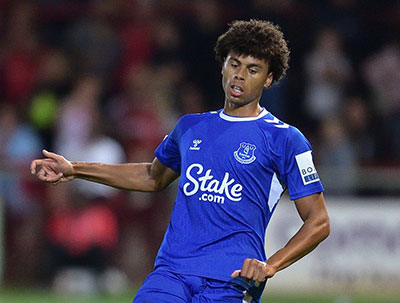Fans Comment
Rum Business
Sadly, I agree with everything Kenny Fogarty (Toffeeblog) says in his grim summary of the current state of football, and how the game reached such a pretty pass. However, I think a few points might put things into perspective, if not give grounds for a glimmer of optimism. Yes, football is now a business; but that is an inevitable consequence of the way the UK economy has changed in the last 15 years. When Stanley Matthews or even Stanley Bowles were doing their stuff, the game was a distraction for those working in the real economy. Now it is a major part of that economy itself. I would hazard a guess that Beckham and Rooney provide more employment now, directly and indirectly, (from shirt manufacturers to the Sun hack to the street vendor in Bangkok) than the National Coal Board, British Steel and Cammell Laird once did, all rolled into one. In fact, given that, I think it�s more amazing how little they�re paid. (Incidentally, I have a theory that the British attitude to other people�s wealth is driven not so much by what they earn than by what they spend it on, but that�s an article for another day, Coleen). Where wealth lies, concentration of control will inevitably follow, just as it did with railways in the 19th century and oil in the 20th. You may have noticed last week that Tesco announced record profits of �2bn and proclaimed that �1 in every �3 spent in British supermarkets was spent with them. Sound familiar? Stoke, QPR and Burnley have simply gone the same way the local butcher you once had on your high st., victims of an economy in which services are now the only game in town. It�s in the media�s interest to assist this process. The press & TV keep certain clubs in the limelight, creating a fan base that benefits both the club and the company that devotes the (favourable) airtime or column inches to that club. Skyboxes, merchandising, newspapers (with their bloated football sections) � sales of one generate the interest that leads to sales of the other. Between them, the Premiership and the Media have thus created a formidable, lucrative and mutually reinforcing business engine. For example, I cannot fathom the gratuitous hostility to the Blues displayed by Radio 5�s chief commentator Alan Green. Except that he knows he has more listeners out there whose knowledge of football is limited to the Champion�s League Gang of Four and simply want to be reassured that some pesky upstart isn�t going to spoil their private party � or at least doesn�t deserve to. Surely not - this the BBC, bastion of non-commercial impartiality? The same BBC whose erstwhile Director-General, Greg Dyke, had formerly been a Director of Man U. Errr� yes, that BBC� The game of Football as we knew it is in a bad way, terminal even. But that�s because it�s now too important to UK plc to be just a game any more. The new Premiership-Media Business Engine creates thousands of jobs, massive overseas earnings and valuable tax revenues. We will not return to the days of player loyalty, genuine cup giant killing and matchday programmes that don�t look like issues of Cosmopolitan, any more than Britain will return to exporting steel, coal or battleships. Do you remember when the final whistle blew at the Everton-Southampton Semi-final in 1984 at Highbury, someone in the main stand unfurled a massive banner that read: �Victory to Everton and The Miners�? More than just football has changed in the last 20 years. So is it all over? Have Chelsea, Man U and Arsenal engineered a permanent shift in the game? Well, I believe it�s too early to say. Firstly, remember when Tesco was where groceries went to die and Sainsbury�s and M&S were the kings of the High St? Exactly. Business has its own Darwinian laws, and success in the new business of footy, even for the current big three, is still dependent on having a team that wins things - even more so when the much vaunted global fan base they rely on is likely to melt away as quickly as it came when the brand ceases to be cool. Man U and Arsenal have had pretty respectable seasons this year � top 3, FA Cup final, CC knockout stage - but one of them will finish with zip in the trophy cabinet. Repeat that over a few years, and is that feckless 10-year-old in Barnstaple or the trendy entrepreneur in Shanghai going to keep buying the shirts? Turn your club into a product and your new �fans� - and the media - will treat you the same way they treat any shop that no longer has what they want. The new economics of football could well turn out to be a double-edged sword. The fans of the pre-premiership era put up with dull football, appalling facilities, occasional threats to their own personal safety and Jimmy Hill, and went on stumping up cash at the turnstiles year in year out, without the faintest hope of their team winning anything. What the new fan/customer wants is a fashion accessory, the aura of success by association. Right now. And there�s the catch; even the skewed world of the Premiership has shown that success is ultimately driven by good team management. Newcastle and Liverpool have not been short of support, investment and expensive signings, but have failed to match that with consistent team management � and are struggling not just on the pitch but also financially. Then consider that Man U and Arsenal have yet to be tested in the Premiership post-Ferguson or post- Wenger. IMWT, indeed. Secondly, football is still a game, and even in a game that is increasingly rigged, whether through seeding, fixture manipulation or worse, there�s an element of chance that can be as fatal as it�s unpredictable (eg. Dyer and Bowyer�s punch up and its impact on Newcastle�s cup chances). Such unpredictability may not put off your average Russian Oligarch who�s got enough yachts and simply wants to lie low until the heat dies down back home, but is still a deterrent to serious, long- term investors. Especially when the downside of a winner takes all world is so frightening (cue Leeds/Ridsdale clich�). Thirdly, Kenny rightly cites Man U and Chelsea as the most outrageous instances of this pernicious new order. But Arsenal have been doing pretty well without the same resources; transfer dealings have been a shrewd balance between sales and acquisitions, and they don�t have a global brand (North Dublin doesn�t count). They seem to be playing catch up with the Emirates deal, but it still proves that the key is sound (rather than rapacious) financial and on-field management. Lastly, there has always been a ruling elite in football, from Blackburn Olympic and The Royal Engineers to Revie and Shankly. However much money Abramovitch pumps in, I doubt if Chelsea will win the title with the same distressing regularity, or over the same period, as the dark side did between 1973 and 1988. Similarly, money has always talked in the game. Worried about the magic going out of the FA Cup? Well, Everton once persuaded little Chesterfield to switch an FA Cup tie to Goodison, guaranteeing bigger gate receipts, which we then won 3-0 - and that was in 1906! The implications of this for Everton Football Club are not necessarily disastrous. There will always be a leading clutch of clubs, but the unforgiving laws of business suggest that that group will change over time � with the gods of today one day lying in a rubble of their own making. Provided we focus on picking good team managers and good CEO�s, first, and good players second, we can take our turn in that group. After all, isn�t the CEO of Tesco now our �Special advisor��? Michael Coffey "Fans Comment" articles are submitted by outside contributors to ToffeeWeb. The views contained therein may not correspond with those of the site owners. Editorial policy
|











